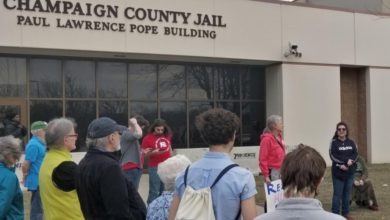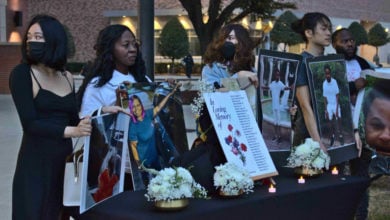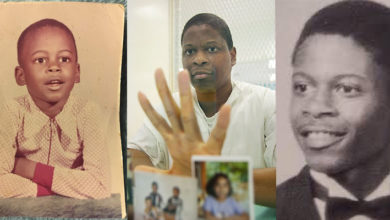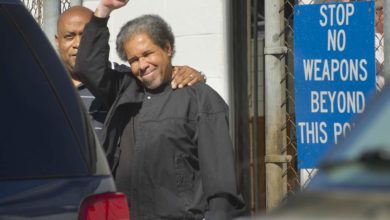(Originally posted on
Prisoner Hunger Strike Solidarity
As this struggle enters a new phase post-initial-negotiation with the
CDCR, supporters outside prison are called on to carry this fight and
make sure that the CDCR follows through with its offer of good faith.
Supporters everywhere are called on to continue to amplify prisoners’
voices, and to strengthen our ties and connections to better consolidate
a growing movement against imprisonment, torture, and all violence.
Please keep encouraging everyone you know to refer to this website as a
source for information regarding the hunger strike, and the ongoing work
to win the five core demands presented by the Pelican Bay hunger
strikers.
Written Statement by Short Corridor Collective (a small representative of the Hunger Strike Leaders at Pelican Bay)
To Supporters:
On July 1, 2011, a collective group of PBSP-SHU inmates composed of
all races began an indefinite hunger strike as a means of peacefully
protesting 20-40 years of human rights violations. The offenses against
us rose to the level of both physical and mental torture—for example,
the coercing of SHU inmates into becoming known informants for the state
and thereby placing those prisoners, and possibly their families
outside of prison, at serious risk of danger in response to being known
to have informed on and caused harm to other inmates via informing on
them. The decision to strike was not made on a whim. It came about in
response to years of subjection to progressively more primitive
conditions and decades of isolation, sensory deprivation and total lack
of normal human contact, with no end in sight. This reality, coupled
with our prior ineffective collective filing of thousands of inmate
grievances and hundreds of court actions to challenge such blatantly
illegal policies and practices (as more fully detailed and supported by
case law, in our formal complaint available online here)
led to our conclusion that a peaceful protest via hunger strike was our
only available avenue to expose what’s really been going on here in
CDCR-SHU prisons and to force meaningful change.
We ended the hunger strike the evening of July 20, 2011, on the basis
of CDCR’s top level administrators’ interactions with our team of
mediators, as well as with us directly, wherein they agreed to accede to
a few small requests immediately, as a tangible good faith gesture in
support of their assurance that all of our other issues will receive
real attention, with meaningful changes being implemented over time.
They made it clear: such changes would not happen over night, nor would
they be made in response to a hunger strike going on.
Many inmates across the state heard about our protest and rose to the
occasion in a solid show of support and solidarity, as did thousands of
people around the world! Many inmates put their health and lives on the
line; many came close to death and experienced medical emergencies. All
acted for the collective cause and recognized the great potential for
forcing change on the use of SHU units across the country.
With this support in mind, a core group of us was committed to taking
the hunger strike to the death, if necessary, to force the changes
sought. Naturally, though, we hoped it would not come to that!
On July 20, 2011, several top CDCR administrators sat across the
table from us and made assurances that they are in the process of making
meaningful changes right now, and will make affecting change a priority
in the future, while providing regular updates and engaging in
additional dialogue. And, we know they’re being forced to restructure
the entire CDCR system in response to the U.S. Supreme Court’s Plata
ruling, which deals with reduction of inmate population.
Thus, our collective decision was to end the hunger strike, on basis
of their good faith gesture with a few small things and to give them the
opportunity to make good on their assurances, e.g. an end to human
rights abuses and torture. This decision drew from our view that we have
been successful in exposing CDCR’s illegal policies and practices to
the world!
And, when it’s all said and done, there comes a point where you have
to give an entity the opportunity to perform their end of an agreement
and the bottom line is this: CDCR could have signed off on a piece of
paper, granting all of our demands and telling us, “you’ll all be cut
loose to the general population prison in six months.” Then, six months
later, tell us, “we’ve reconsidered and it’s not happening.” So, we’ll
see soon enough where CDCR is really coming from. More important is the
fact that while the hunger strike is over, the resistance/struggle to
end our subjection to (SHU) human rights violations and torture is just
beginning!
We’ve drawn the line on this and should CDCR fail to carry out
meaningful changes in a timely fashion, then we will initiate a class
action suit and additional types of peaceful protest. We will not stop
until the CDCR ends the illegal policies and practices at SHU!
We’re counting on all of our outside supporters to continue to
collectively support us and to carry on with shining light on our
resistance in here. This is the right time for change in these prisons
and the movement is growing across the land! Without the peoples’
support outside, we cannot be successful! All support, no matter the
size, or content, comes together as a powerful force. We’ve already
brought more mainstream exposure about these CDCR-SHU’s than ever before
and our time for real change to this system is now! As for CDCR’s
propaganda—that the hunger strike was initiated and ordered by gang
members and the fact that up to 6,600 inmates participated in 13 prisons
across the state demonstrates the gangs’ influence, which is why
they’re in SHU in the first place—our response is, (1) CDCR has never
responded to our formal complaint, wherein we state, many of us have
been in SHU 10-40 years, just based on a CDCR gang label, based on
claims by confidential inmate informants; we have never been found
guilty of committing an illegal gang-related act! Meanwhile, tens of
thousands of other inmates whom CDCR has also labeled as gang affiliates
are allowed in the general population of prisons! And, (2) the other
inmates who participated did so based on their own recognition of, and
decision to resist and protest, their similar conditions! All of our
public statements about the PBSP-SHU protest clearly stated it was
voluntary and those whose age and/or medical issues were an issue,
should not participate! If PBSP-SHU inmates had the influence over the
gang affiliates in CDCR prisons, as their propaganda claims, there
wouldn’t have been tens of thousands of inmates participating in the
hunger strike (by CDCR’s own statistics, their system is composed of
approximately 70% gang affiliates—that’s 70% of more than 140,000
inmates!)
The protest and resistance is not about gangs. It’s all about a
collective effort to end the torture in these SHUs and we hope it will
serve as an example to all inmates: there’s real power in collective
peaceful protest actions.
Todd Ashker, Arturo Castellanos, George Franco, Louis Powell.
Written July 22nd, 2011






